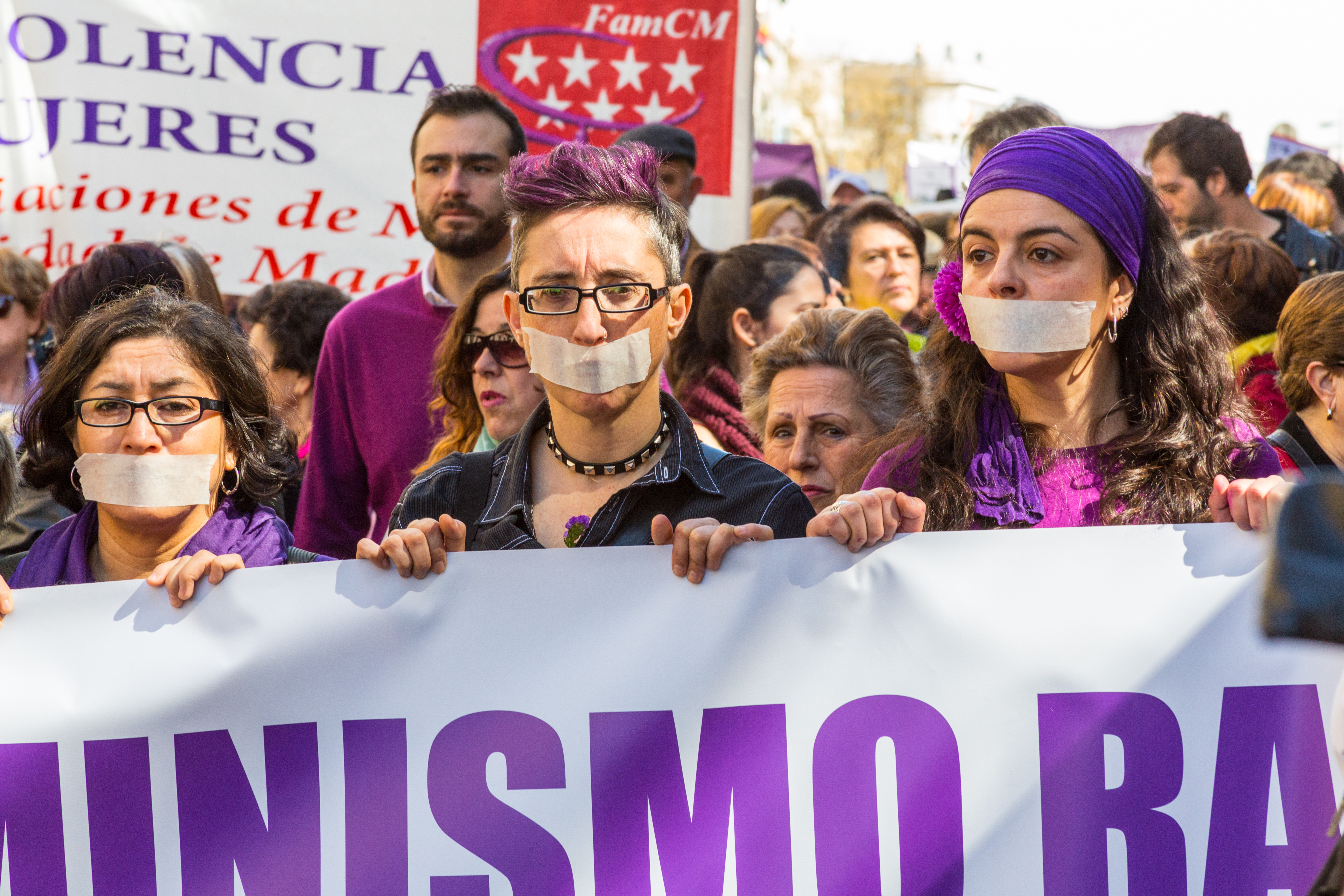If women ruled the world
Words: Michel Cruz

If we look back across history it tells us a tale of war and destruction; empires built on blood, neighbouring tribes and states at war over land and spoils, religious and racial intolerance leading to conflict and decimation – all vestiges of a never-ending spiral of aggression, violence and abuse. Though ours is a beautiful blue-green haven in the universe it offers enough challenges in the form of famine, epidemics and natural disasters, as well as the everyday trials and tribulations of human life, but the maniacal greed and ambition of states, zealots and ultimately men in power has more than overshadowed natural issues to often turn a would-be paradise into hell.
In ancient societies men were tasked with hunting and protecting the tribe, developing the adrenalin and testosterone rush that serves one well in violent situations but doesn’t bode well for a continued peaceful existence, whether on a large or domestic scale. Women nurtured the family but also protected it, and as in nature balanced gentle care with the ability to be aggressive when defending their own. It is therefore not that women don’t possess aggression or ambition, or can’t be mad or bad, but that typically their main focus is on their own environment, and lies not in dreams of conquering the world. To be fair, the latter applies only to a small number of men – usually statesmen, ideologues and also often ruthless commercial empire builders – but throughout history there have been more than enough of them, and they have been able to muster enough following to more or less permanently disrupt life on the planet.
It is this never-ending hunger for power, be it political or commercial, that has shaped human society, wounds and all, and so as feminism dawned and women began to assert themselves in the spheres of politics, academia and the business worlds that the question first arose: what if women ruled the world? Would it be a better place? Look around you at a world where sexual violence, exploitation, domestic abuse and the cultural/religious subjugation of women are still rife and in many cases institutionally engrained in many regions, and you are tempted to say they couldn’t do any worse. Add the disparity of wealth and the aggressive exploitation of the environment, and the conviction becomes stronger.
Would the world be a better place – or, what is the difference between men and women?
 It’s tempting to instinctively say yes, but both this question and the world in general are too complicated for simple, unconsidered answers. The same feminists who assert that men and women are equal, and who for a long time said the main differences between them result from nurture (as in societal conditioning), not inherent nature, will in many cases fervently and unequivocally claim that the world would be a paradise if run by women, not men. Since we don’t have practical examples to refer to it remains conjecture for now, but when you so strongly believe that the world under female control would be near perfect there is an underlying inference that men are essentially bad and women good. In other words, that men represent the forces of evil and women the forces of good.
It’s tempting to instinctively say yes, but both this question and the world in general are too complicated for simple, unconsidered answers. The same feminists who assert that men and women are equal, and who for a long time said the main differences between them result from nurture (as in societal conditioning), not inherent nature, will in many cases fervently and unequivocally claim that the world would be a paradise if run by women, not men. Since we don’t have practical examples to refer to it remains conjecture for now, but when you so strongly believe that the world under female control would be near perfect there is an underlying inference that men are essentially bad and women good. In other words, that men represent the forces of evil and women the forces of good.
This, of course, can’t be true, for in everyday society we know that there are good and bad men, and good and bad women, that madness, greed, violence, cruelty, envy and megalomania can befall all of humankind, regardless of race, class or gender. The most obvious problem with men, however, is that across the world they tend to fall into two categories: the mostly peaceful, gentle and considered kind, and the violent type. The latter can again be divided into two categories, namely those who are ruthless in their ambition, and those who are merely aggressive – often ending up as the foot soldiers of the former. It is therefore not men in general but this type of man that is the root of many of the violence-related issues in the world, from crime, rape and domestic violence to conflict and war. Though he might build empires he destructs where other men have proven to have given so much to the world, be it in the form of art, culture, science, medicine and yes, also humanitarian thinking, for many of the world’s greatest humanists have been men.
Another apparent difference between men and women is the greater focus on the outward world that men have while women are more concerned with their own environment – that part of society they can actually control. For this reason you will often hear men begin with sport and end up on world politics at a dinner party, where the women begin with news or entertainment and end up talking about people and situations closer to them. At the risk of generalising, for there are many deviations from the mean, such patterns are very revealing, as they provide an insight into the psyche. Men are also more likely to follow sport, and be motivated by its competitive and sometimes tribal nature, where women have a greater tendency for art, visual beauty and the desire to take time to ‘smell the flowers’.
The above differences between men and women are a mix of nature and nurture, and not a problem in themselves if they are moderate. It’s the more extreme version of male characteristics that leads to many of the problems we have experienced in patriarchal societies, and this brings us back to the category of man driven by aggression, in whatever form. I am no psychologist but I suspect there is a Freudian driver behind our behaviour, with men driven at the very basest level by sex, or the desire to be a champion and all-conquering among women, where women seem at the basest level to be driven by social competition with one-another. If so, this again reveals a great deal about how the two sexes behave and react, especially when in a position of power, and it could begin to provide an answer to the question we have posed.
 From hell to paradise
From hell to paradise
At first glance, then, men are loud, overbearing, aggressive and violent, while women are kind, gentle, nurturing and loving. Such a classic definition would lead to a simple answer: yes, the world would be irrevocably better if run by women. However, we need only look around us to know that such simplistic characterisations belong to the world of fairy tales. Agreed, there is a kind of man who whether a violent Neanderthal or a cunning sophisticate has helped to turn paradise into hell, but many women are also loud, aggressive, inconsiderate, selfish and destructive, so you need a more nuanced approach if you are going to provide a serious answer to such a fascinating question.
It is the highly driven who rise to positions of influence, and unfortunately a disproportionate percentage of them belong to the destructive category, in men, and I believe it isn’t that different among women. This means that cunning and/or violent men would likely be replaced by cunning, ambitious and also ruthless women who if not inherently violent themselves would use the manpower of simple aggressors, very much like male leaders have done throughout history. Driven not so much by a sexually-stimulated impulse for domination and control, their desire to be top dog would be driven more by social competition, and yes, power and success act as an aphrodisiac for men and women alike. Examples from history appear to support my theory, as female leaders from Agrippina and Queen Elizabeth I to Catherine the Great, Ranavalona and Margaret Thatcher were far from soft.
Feminists would say that these were women who had to be hard in a man’s world, playing to the rules of men and thereby denying their inherently female instincts, but again, there is no evidence of this in everyday society where women are often fiercer than men, and also no known examples of a utopian female or female-led society where all is well and peaceful. Men and women are both capable of kindness, subterfuge and aggression, and the leaders we have – man or woman – come from within a human society, not a uniquely male or female one. It is always tempting to look at the world and blame it on those you think are responsible, thereby declaring the other part of humanity as inherently righteous. We have seen this in class and racial conflicts too, but my belief is that the world would only ever be a better place – never unfortunately a perfect paradise – if leaders came not from the powerful and ambitious, but from those people who have the ability to look beyond their drives and interests, and they could be men as well as women, and should indeed be a mix of both.
What one cannot deny is that there would be less tolerance towards sexual violence, the abuse of children and perhaps also the degradation of the environment and glaring social disparities if more women were in positions of power – bearing in mind they are the right kind of leader themselves. The United Nations has long stated that women are the future of Africa as only once there is an end to the violence, rape and pillaging that besets that continent will it ever have a chance to enjoy progress and a better way of life. The world became a more civilised place when we left the dark old ages behind and the power, not of men, but of violent, destructive men was reduced, and for much of the developing world in particular remains an important mission that will not only result in greater prosperity but also is our main hope for peace in the world – a peace that also has to include mutual respect between men and women, for we are one humanity, not two.
First published in Essential Magazine.












